Effects of Junk Food on School Age Children: A Scientific Merit Report
VerifiedAdded on 2023/04/24
|11
|2461
|307
Report
AI Summary
This report, titled "Effects of Junk Food on School Age Children," evaluates the scientific merit of various studies examining the socio-psychological factors behind junk food consumption in children. It explores the impact of junk food on children's health, behavior, and academic performance. The report analyzes research methods, limitations, and identifies key theories related to food consumption behavior, including the taxonomy of determinants and food choice process models. The author highlights the importance of future research, emphasizing the need for more primary data collection and positivist research designs to investigate the psychological factors and real-time data. The report also discusses the components of scientific merit, such as control, rigor, systematic approach, validity, and empirical presentation, while also highlighting the importance of critical analysis. It concludes that while the chosen articles provide valuable insights, more practical data and quantitative interpretation are needed to improve the scientific merit of future studies.
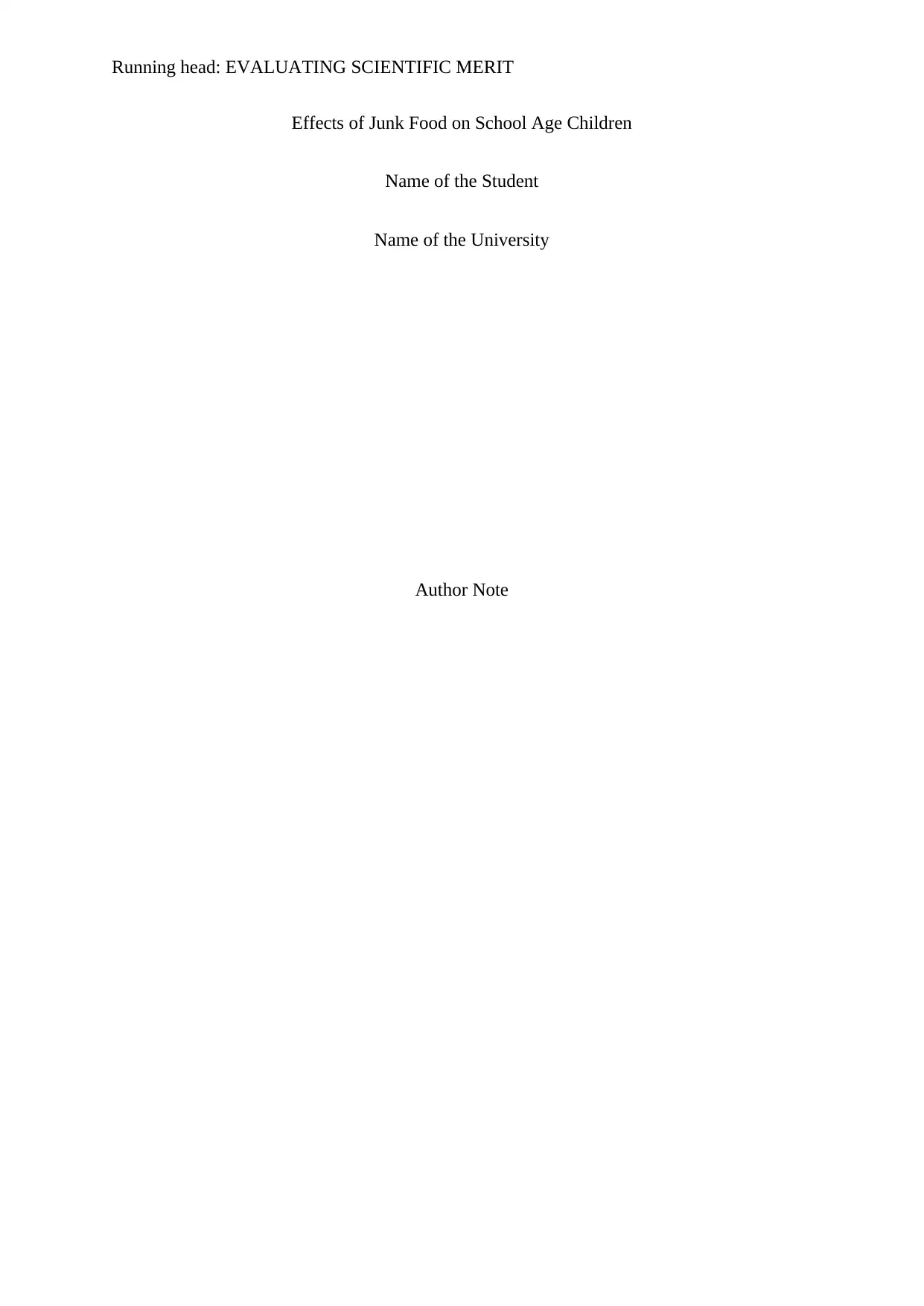
Running head: EVALUATING SCIENTIFIC MERIT
Effects of Junk Food on School Age Children
Name of the Student
Name of the University
Author Note
Effects of Junk Food on School Age Children
Name of the Student
Name of the University
Author Note
Paraphrase This Document
Need a fresh take? Get an instant paraphrase of this document with our AI Paraphraser
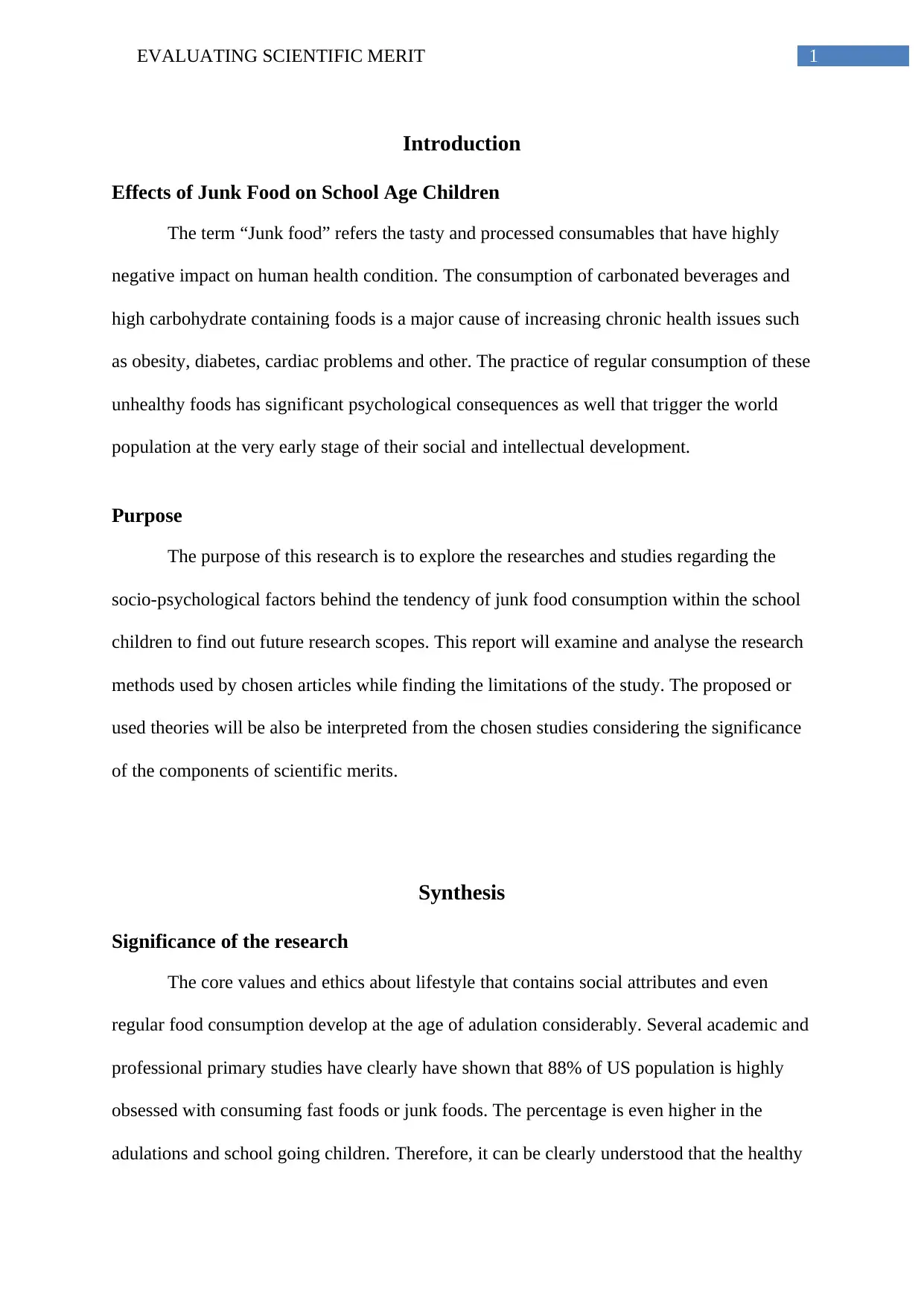
1EVALUATING SCIENTIFIC MERIT
Introduction
Effects of Junk Food on School Age Children
The term “Junk food” refers the tasty and processed consumables that have highly
negative impact on human health condition. The consumption of carbonated beverages and
high carbohydrate containing foods is a major cause of increasing chronic health issues such
as obesity, diabetes, cardiac problems and other. The practice of regular consumption of these
unhealthy foods has significant psychological consequences as well that trigger the world
population at the very early stage of their social and intellectual development.
Purpose
The purpose of this research is to explore the researches and studies regarding the
socio-psychological factors behind the tendency of junk food consumption within the school
children to find out future research scopes. This report will examine and analyse the research
methods used by chosen articles while finding the limitations of the study. The proposed or
used theories will be also be interpreted from the chosen studies considering the significance
of the components of scientific merits.
Synthesis
Significance of the research
The core values and ethics about lifestyle that contains social attributes and even
regular food consumption develop at the age of adulation considerably. Several academic and
professional primary studies have clearly have shown that 88% of US population is highly
obsessed with consuming fast foods or junk foods. The percentage is even higher in the
adulations and school going children. Therefore, it can be clearly understood that the healthy
Introduction
Effects of Junk Food on School Age Children
The term “Junk food” refers the tasty and processed consumables that have highly
negative impact on human health condition. The consumption of carbonated beverages and
high carbohydrate containing foods is a major cause of increasing chronic health issues such
as obesity, diabetes, cardiac problems and other. The practice of regular consumption of these
unhealthy foods has significant psychological consequences as well that trigger the world
population at the very early stage of their social and intellectual development.
Purpose
The purpose of this research is to explore the researches and studies regarding the
socio-psychological factors behind the tendency of junk food consumption within the school
children to find out future research scopes. This report will examine and analyse the research
methods used by chosen articles while finding the limitations of the study. The proposed or
used theories will be also be interpreted from the chosen studies considering the significance
of the components of scientific merits.
Synthesis
Significance of the research
The core values and ethics about lifestyle that contains social attributes and even
regular food consumption develop at the age of adulation considerably. Several academic and
professional primary studies have clearly have shown that 88% of US population is highly
obsessed with consuming fast foods or junk foods. The percentage is even higher in the
adulations and school going children. Therefore, it can be clearly understood that the healthy
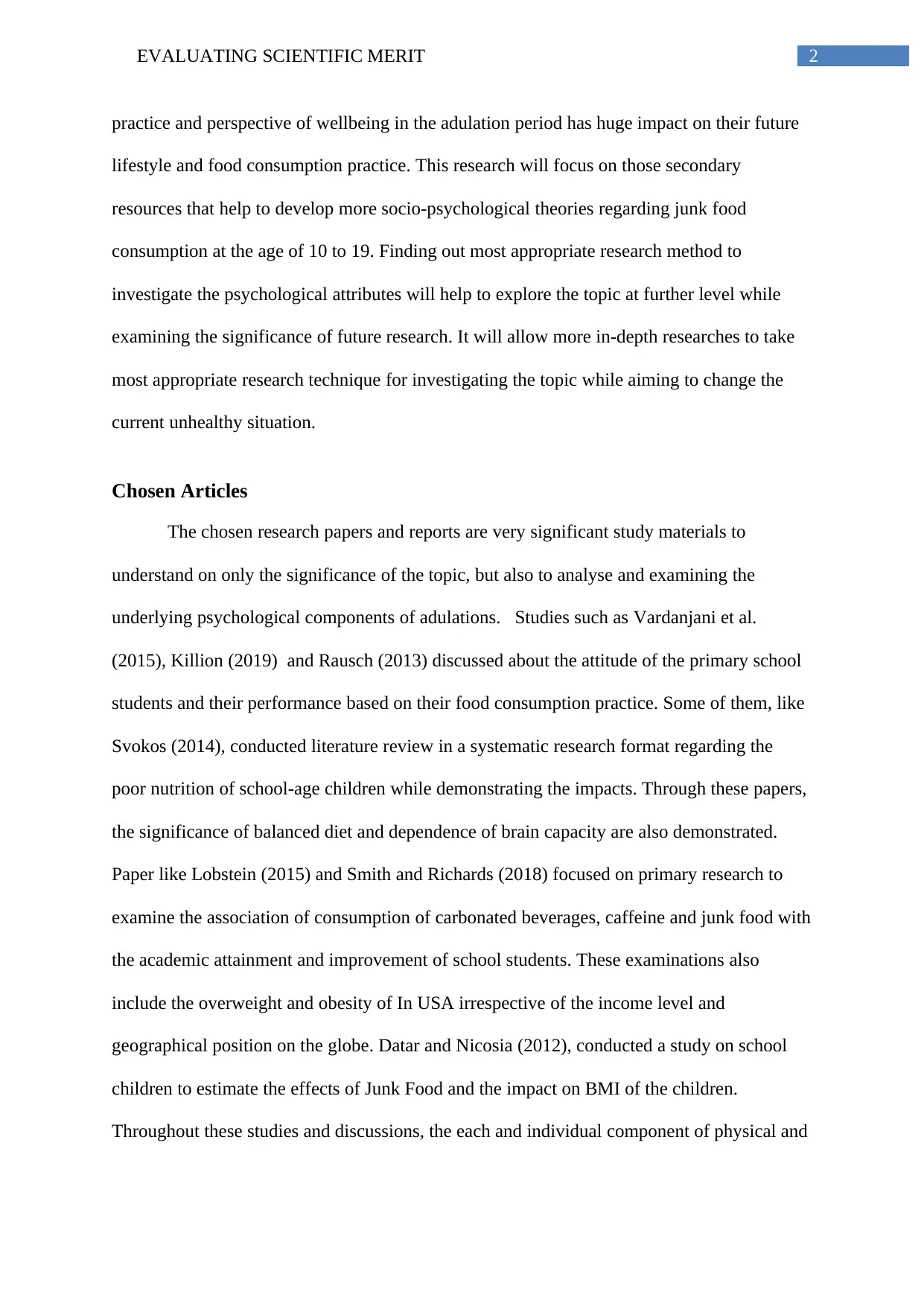
2EVALUATING SCIENTIFIC MERIT
practice and perspective of wellbeing in the adulation period has huge impact on their future
lifestyle and food consumption practice. This research will focus on those secondary
resources that help to develop more socio-psychological theories regarding junk food
consumption at the age of 10 to 19. Finding out most appropriate research method to
investigate the psychological attributes will help to explore the topic at further level while
examining the significance of future research. It will allow more in-depth researches to take
most appropriate research technique for investigating the topic while aiming to change the
current unhealthy situation.
Chosen Articles
The chosen research papers and reports are very significant study materials to
understand on only the significance of the topic, but also to analyse and examining the
underlying psychological components of adulations. Studies such as Vardanjani et al.
(2015), Killion (2019) and Rausch (2013) discussed about the attitude of the primary school
students and their performance based on their food consumption practice. Some of them, like
Svokos (2014), conducted literature review in a systematic research format regarding the
poor nutrition of school-age children while demonstrating the impacts. Through these papers,
the significance of balanced diet and dependence of brain capacity are also demonstrated.
Paper like Lobstein (2015) and Smith and Richards (2018) focused on primary research to
examine the association of consumption of carbonated beverages, caffeine and junk food with
the academic attainment and improvement of school students. These examinations also
include the overweight and obesity of In USA irrespective of the income level and
geographical position on the globe. Datar and Nicosia (2012), conducted a study on school
children to estimate the effects of Junk Food and the impact on BMI of the children.
Throughout these studies and discussions, the each and individual component of physical and
practice and perspective of wellbeing in the adulation period has huge impact on their future
lifestyle and food consumption practice. This research will focus on those secondary
resources that help to develop more socio-psychological theories regarding junk food
consumption at the age of 10 to 19. Finding out most appropriate research method to
investigate the psychological attributes will help to explore the topic at further level while
examining the significance of future research. It will allow more in-depth researches to take
most appropriate research technique for investigating the topic while aiming to change the
current unhealthy situation.
Chosen Articles
The chosen research papers and reports are very significant study materials to
understand on only the significance of the topic, but also to analyse and examining the
underlying psychological components of adulations. Studies such as Vardanjani et al.
(2015), Killion (2019) and Rausch (2013) discussed about the attitude of the primary school
students and their performance based on their food consumption practice. Some of them, like
Svokos (2014), conducted literature review in a systematic research format regarding the
poor nutrition of school-age children while demonstrating the impacts. Through these papers,
the significance of balanced diet and dependence of brain capacity are also demonstrated.
Paper like Lobstein (2015) and Smith and Richards (2018) focused on primary research to
examine the association of consumption of carbonated beverages, caffeine and junk food with
the academic attainment and improvement of school students. These examinations also
include the overweight and obesity of In USA irrespective of the income level and
geographical position on the globe. Datar and Nicosia (2012), conducted a study on school
children to estimate the effects of Junk Food and the impact on BMI of the children.
Throughout these studies and discussions, the each and individual component of physical and
⊘ This is a preview!⊘
Do you want full access?
Subscribe today to unlock all pages.

Trusted by 1+ million students worldwide
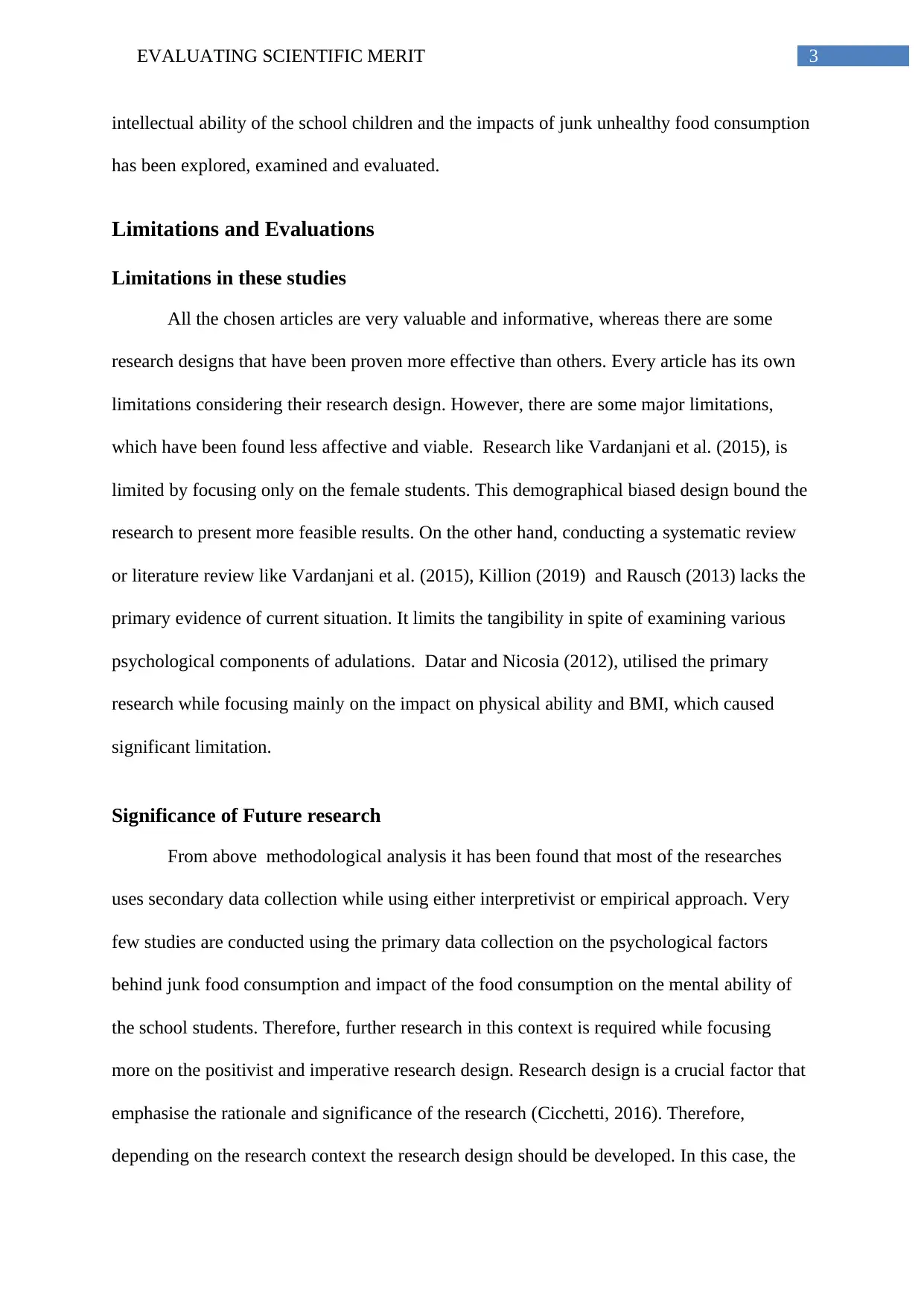
3EVALUATING SCIENTIFIC MERIT
intellectual ability of the school children and the impacts of junk unhealthy food consumption
has been explored, examined and evaluated.
Limitations and Evaluations
Limitations in these studies
All the chosen articles are very valuable and informative, whereas there are some
research designs that have been proven more effective than others. Every article has its own
limitations considering their research design. However, there are some major limitations,
which have been found less affective and viable. Research like Vardanjani et al. (2015), is
limited by focusing only on the female students. This demographical biased design bound the
research to present more feasible results. On the other hand, conducting a systematic review
or literature review like Vardanjani et al. (2015), Killion (2019) and Rausch (2013) lacks the
primary evidence of current situation. It limits the tangibility in spite of examining various
psychological components of adulations. Datar and Nicosia (2012), utilised the primary
research while focusing mainly on the impact on physical ability and BMI, which caused
significant limitation.
Significance of Future research
From above methodological analysis it has been found that most of the researches
uses secondary data collection while using either interpretivist or empirical approach. Very
few studies are conducted using the primary data collection on the psychological factors
behind junk food consumption and impact of the food consumption on the mental ability of
the school students. Therefore, further research in this context is required while focusing
more on the positivist and imperative research design. Research design is a crucial factor that
emphasise the rationale and significance of the research (Cicchetti, 2016). Therefore,
depending on the research context the research design should be developed. In this case, the
intellectual ability of the school children and the impacts of junk unhealthy food consumption
has been explored, examined and evaluated.
Limitations and Evaluations
Limitations in these studies
All the chosen articles are very valuable and informative, whereas there are some
research designs that have been proven more effective than others. Every article has its own
limitations considering their research design. However, there are some major limitations,
which have been found less affective and viable. Research like Vardanjani et al. (2015), is
limited by focusing only on the female students. This demographical biased design bound the
research to present more feasible results. On the other hand, conducting a systematic review
or literature review like Vardanjani et al. (2015), Killion (2019) and Rausch (2013) lacks the
primary evidence of current situation. It limits the tangibility in spite of examining various
psychological components of adulations. Datar and Nicosia (2012), utilised the primary
research while focusing mainly on the impact on physical ability and BMI, which caused
significant limitation.
Significance of Future research
From above methodological analysis it has been found that most of the researches
uses secondary data collection while using either interpretivist or empirical approach. Very
few studies are conducted using the primary data collection on the psychological factors
behind junk food consumption and impact of the food consumption on the mental ability of
the school students. Therefore, further research in this context is required while focusing
more on the positivist and imperative research design. Research design is a crucial factor that
emphasise the rationale and significance of the research (Cicchetti, 2016). Therefore,
depending on the research context the research design should be developed. In this case, the
Paraphrase This Document
Need a fresh take? Get an instant paraphrase of this document with our AI Paraphraser
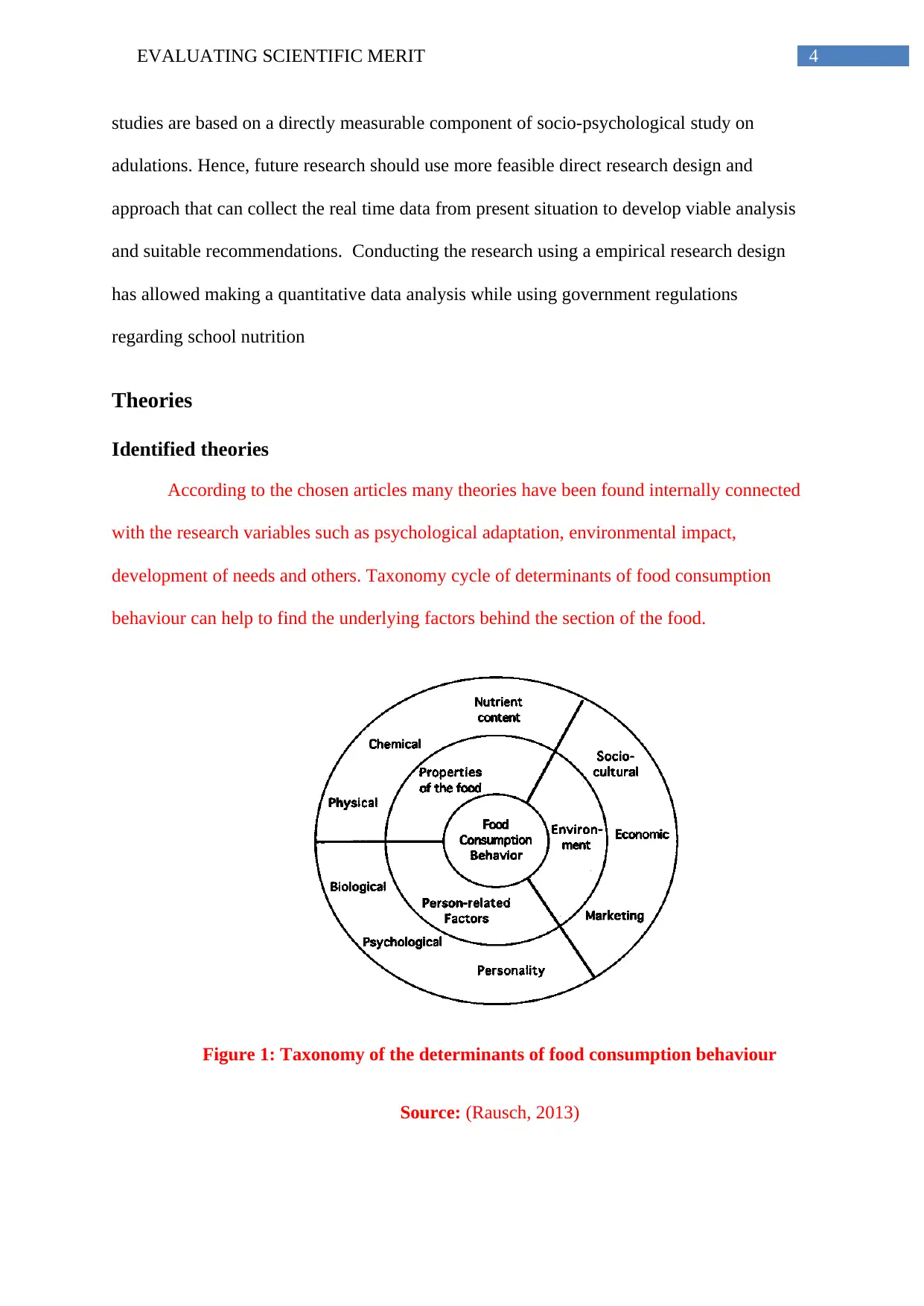
4EVALUATING SCIENTIFIC MERIT
studies are based on a directly measurable component of socio-psychological study on
adulations. Hence, future research should use more feasible direct research design and
approach that can collect the real time data from present situation to develop viable analysis
and suitable recommendations. Conducting the research using a empirical research design
has allowed making a quantitative data analysis while using government regulations
regarding school nutrition
Theories
Identified theories
According to the chosen articles many theories have been found internally connected
with the research variables such as psychological adaptation, environmental impact,
development of needs and others. Taxonomy cycle of determinants of food consumption
behaviour can help to find the underlying factors behind the section of the food.
Figure 1: Taxonomy of the determinants of food consumption behaviour
Source: (Rausch, 2013)
studies are based on a directly measurable component of socio-psychological study on
adulations. Hence, future research should use more feasible direct research design and
approach that can collect the real time data from present situation to develop viable analysis
and suitable recommendations. Conducting the research using a empirical research design
has allowed making a quantitative data analysis while using government regulations
regarding school nutrition
Theories
Identified theories
According to the chosen articles many theories have been found internally connected
with the research variables such as psychological adaptation, environmental impact,
development of needs and others. Taxonomy cycle of determinants of food consumption
behaviour can help to find the underlying factors behind the section of the food.
Figure 1: Taxonomy of the determinants of food consumption behaviour
Source: (Rausch, 2013)
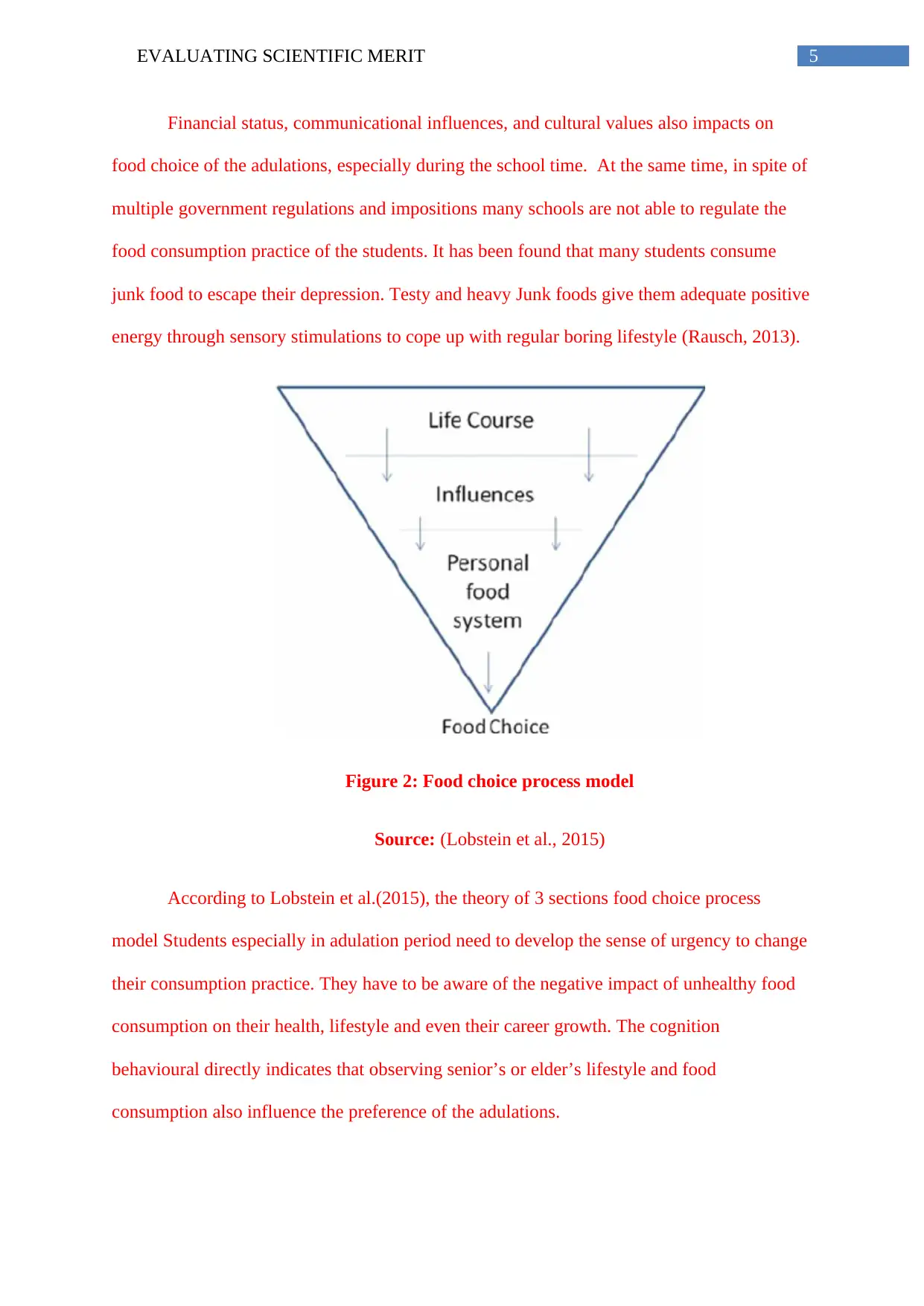
5EVALUATING SCIENTIFIC MERIT
Financial status, communicational influences, and cultural values also impacts on
food choice of the adulations, especially during the school time. At the same time, in spite of
multiple government regulations and impositions many schools are not able to regulate the
food consumption practice of the students. It has been found that many students consume
junk food to escape their depression. Testy and heavy Junk foods give them adequate positive
energy through sensory stimulations to cope up with regular boring lifestyle (Rausch, 2013).
Figure 2: Food choice process model
Source: (Lobstein et al., 2015)
According to Lobstein et al.(2015), the theory of 3 sections food choice process
model Students especially in adulation period need to develop the sense of urgency to change
their consumption practice. They have to be aware of the negative impact of unhealthy food
consumption on their health, lifestyle and even their career growth. The cognition
behavioural directly indicates that observing senior’s or elder’s lifestyle and food
consumption also influence the preference of the adulations.
Financial status, communicational influences, and cultural values also impacts on
food choice of the adulations, especially during the school time. At the same time, in spite of
multiple government regulations and impositions many schools are not able to regulate the
food consumption practice of the students. It has been found that many students consume
junk food to escape their depression. Testy and heavy Junk foods give them adequate positive
energy through sensory stimulations to cope up with regular boring lifestyle (Rausch, 2013).
Figure 2: Food choice process model
Source: (Lobstein et al., 2015)
According to Lobstein et al.(2015), the theory of 3 sections food choice process
model Students especially in adulation period need to develop the sense of urgency to change
their consumption practice. They have to be aware of the negative impact of unhealthy food
consumption on their health, lifestyle and even their career growth. The cognition
behavioural directly indicates that observing senior’s or elder’s lifestyle and food
consumption also influence the preference of the adulations.
⊘ This is a preview!⊘
Do you want full access?
Subscribe today to unlock all pages.

Trusted by 1+ million students worldwide
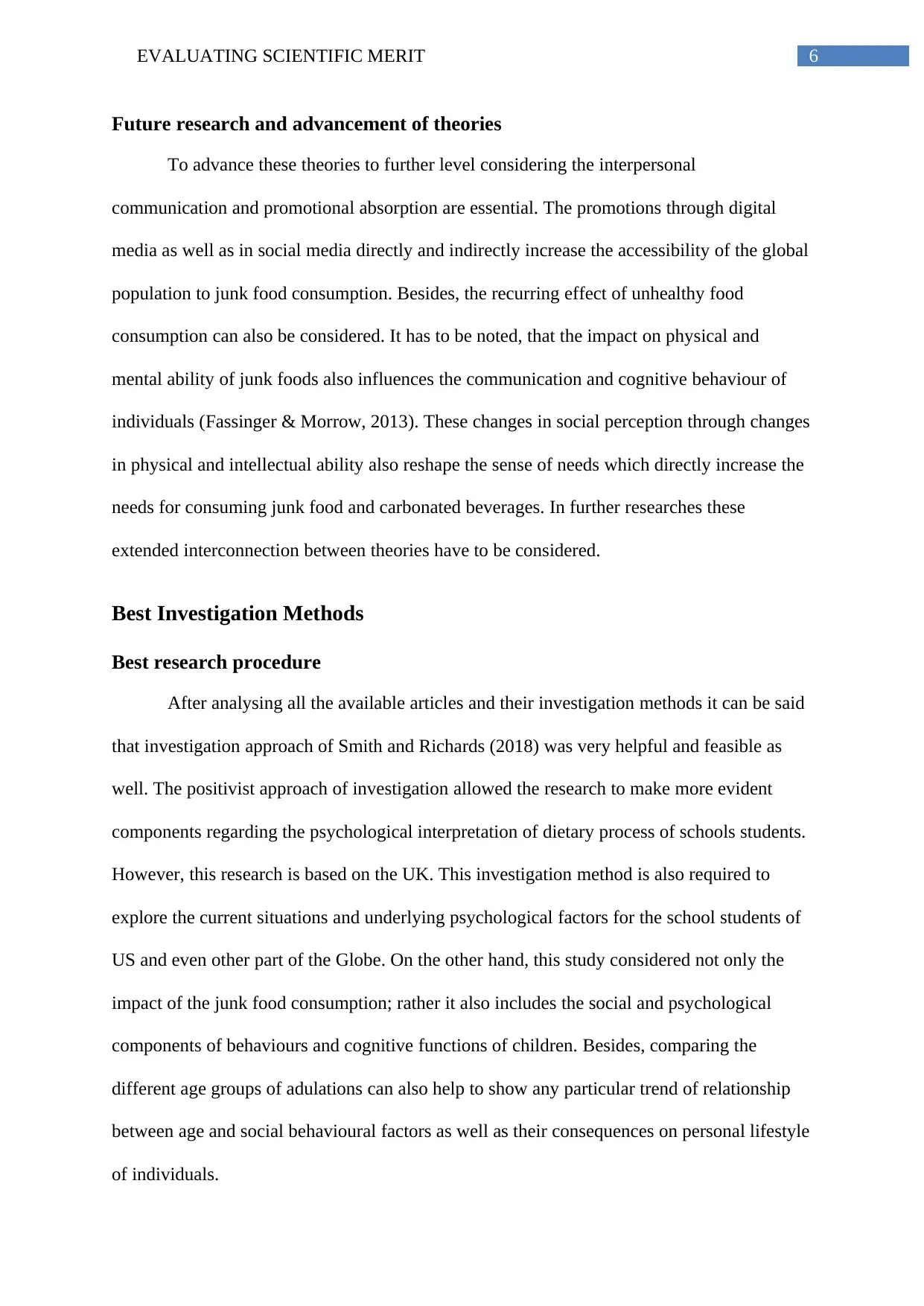
6EVALUATING SCIENTIFIC MERIT
Future research and advancement of theories
To advance these theories to further level considering the interpersonal
communication and promotional absorption are essential. The promotions through digital
media as well as in social media directly and indirectly increase the accessibility of the global
population to junk food consumption. Besides, the recurring effect of unhealthy food
consumption can also be considered. It has to be noted, that the impact on physical and
mental ability of junk foods also influences the communication and cognitive behaviour of
individuals (Fassinger & Morrow, 2013). These changes in social perception through changes
in physical and intellectual ability also reshape the sense of needs which directly increase the
needs for consuming junk food and carbonated beverages. In further researches these
extended interconnection between theories have to be considered.
Best Investigation Methods
Best research procedure
After analysing all the available articles and their investigation methods it can be said
that investigation approach of Smith and Richards (2018) was very helpful and feasible as
well. The positivist approach of investigation allowed the research to make more evident
components regarding the psychological interpretation of dietary process of schools students.
However, this research is based on the UK. This investigation method is also required to
explore the current situations and underlying psychological factors for the school students of
US and even other part of the Globe. On the other hand, this study considered not only the
impact of the junk food consumption; rather it also includes the social and psychological
components of behaviours and cognitive functions of children. Besides, comparing the
different age groups of adulations can also help to show any particular trend of relationship
between age and social behavioural factors as well as their consequences on personal lifestyle
of individuals.
Future research and advancement of theories
To advance these theories to further level considering the interpersonal
communication and promotional absorption are essential. The promotions through digital
media as well as in social media directly and indirectly increase the accessibility of the global
population to junk food consumption. Besides, the recurring effect of unhealthy food
consumption can also be considered. It has to be noted, that the impact on physical and
mental ability of junk foods also influences the communication and cognitive behaviour of
individuals (Fassinger & Morrow, 2013). These changes in social perception through changes
in physical and intellectual ability also reshape the sense of needs which directly increase the
needs for consuming junk food and carbonated beverages. In further researches these
extended interconnection between theories have to be considered.
Best Investigation Methods
Best research procedure
After analysing all the available articles and their investigation methods it can be said
that investigation approach of Smith and Richards (2018) was very helpful and feasible as
well. The positivist approach of investigation allowed the research to make more evident
components regarding the psychological interpretation of dietary process of schools students.
However, this research is based on the UK. This investigation method is also required to
explore the current situations and underlying psychological factors for the school students of
US and even other part of the Globe. On the other hand, this study considered not only the
impact of the junk food consumption; rather it also includes the social and psychological
components of behaviours and cognitive functions of children. Besides, comparing the
different age groups of adulations can also help to show any particular trend of relationship
between age and social behavioural factors as well as their consequences on personal lifestyle
of individuals.
Paraphrase This Document
Need a fresh take? Get an instant paraphrase of this document with our AI Paraphraser
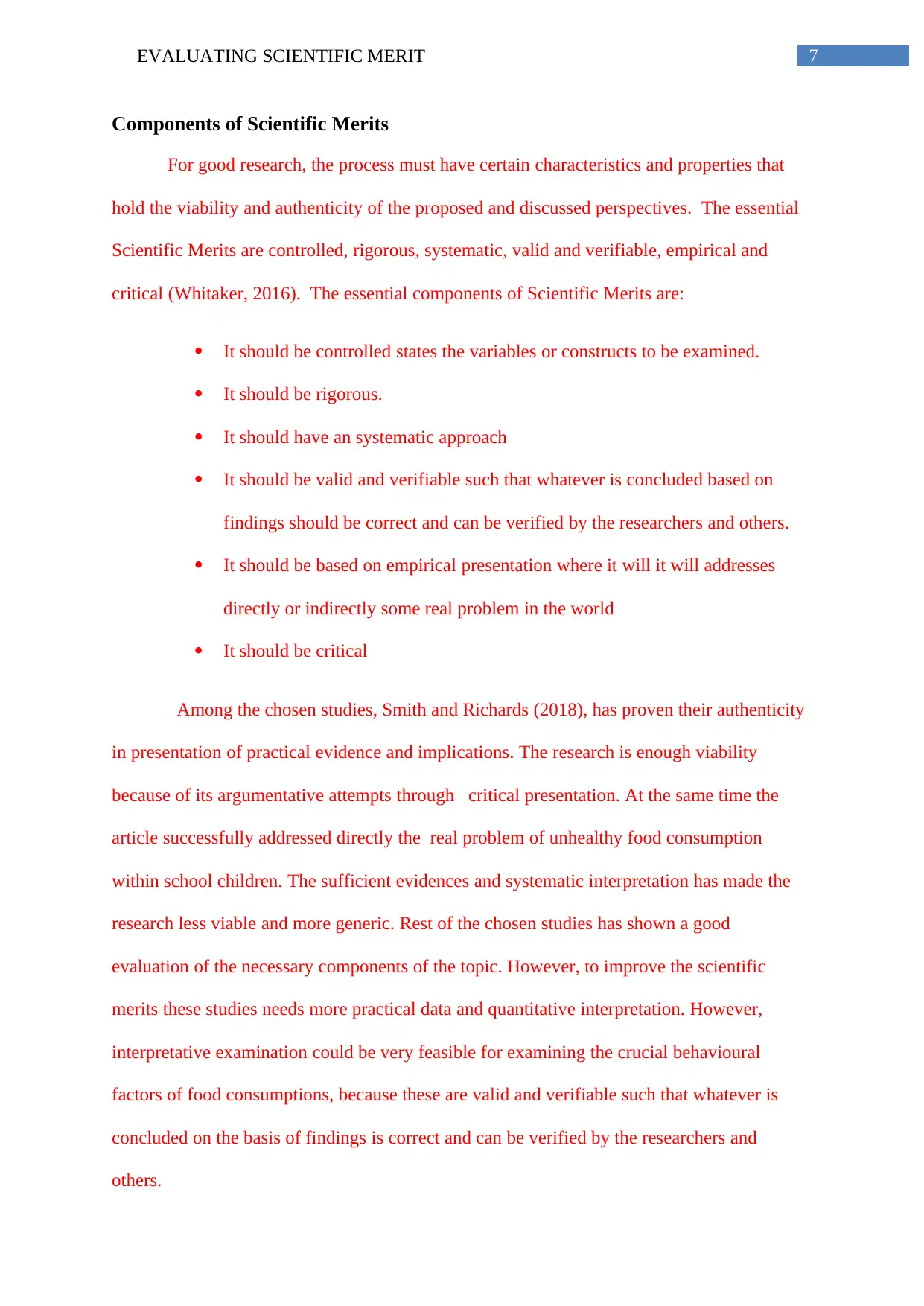
7EVALUATING SCIENTIFIC MERIT
Components of Scientific Merits
For good research, the process must have certain characteristics and properties that
hold the viability and authenticity of the proposed and discussed perspectives. The essential
Scientific Merits are controlled, rigorous, systematic, valid and verifiable, empirical and
critical (Whitaker, 2016). The essential components of Scientific Merits are:
It should be controlled states the variables or constructs to be examined.
It should be rigorous.
It should have an systematic approach
It should be valid and verifiable such that whatever is concluded based on
findings should be correct and can be verified by the researchers and others.
It should be based on empirical presentation where it will it will addresses
directly or indirectly some real problem in the world
It should be critical
Among the chosen studies, Smith and Richards (2018), has proven their authenticity
in presentation of practical evidence and implications. The research is enough viability
because of its argumentative attempts through critical presentation. At the same time the
article successfully addressed directly the real problem of unhealthy food consumption
within school children. The sufficient evidences and systematic interpretation has made the
research less viable and more generic. Rest of the chosen studies has shown a good
evaluation of the necessary components of the topic. However, to improve the scientific
merits these studies needs more practical data and quantitative interpretation. However,
interpretative examination could be very feasible for examining the crucial behavioural
factors of food consumptions, because these are valid and verifiable such that whatever is
concluded on the basis of findings is correct and can be verified by the researchers and
others.
Components of Scientific Merits
For good research, the process must have certain characteristics and properties that
hold the viability and authenticity of the proposed and discussed perspectives. The essential
Scientific Merits are controlled, rigorous, systematic, valid and verifiable, empirical and
critical (Whitaker, 2016). The essential components of Scientific Merits are:
It should be controlled states the variables or constructs to be examined.
It should be rigorous.
It should have an systematic approach
It should be valid and verifiable such that whatever is concluded based on
findings should be correct and can be verified by the researchers and others.
It should be based on empirical presentation where it will it will addresses
directly or indirectly some real problem in the world
It should be critical
Among the chosen studies, Smith and Richards (2018), has proven their authenticity
in presentation of practical evidence and implications. The research is enough viability
because of its argumentative attempts through critical presentation. At the same time the
article successfully addressed directly the real problem of unhealthy food consumption
within school children. The sufficient evidences and systematic interpretation has made the
research less viable and more generic. Rest of the chosen studies has shown a good
evaluation of the necessary components of the topic. However, to improve the scientific
merits these studies needs more practical data and quantitative interpretation. However,
interpretative examination could be very feasible for examining the crucial behavioural
factors of food consumptions, because these are valid and verifiable such that whatever is
concluded on the basis of findings is correct and can be verified by the researchers and
others.
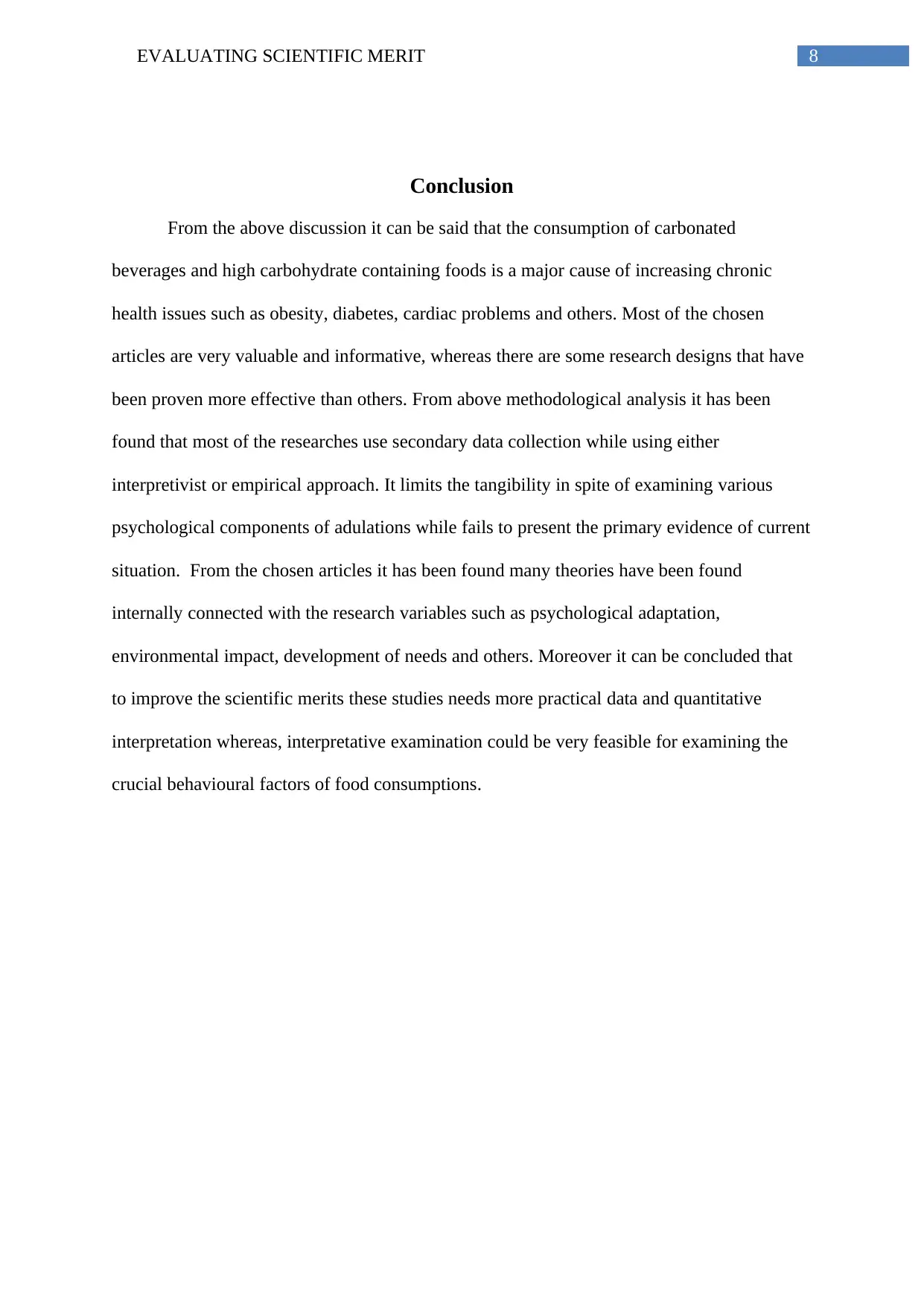
8EVALUATING SCIENTIFIC MERIT
Conclusion
From the above discussion it can be said that the consumption of carbonated
beverages and high carbohydrate containing foods is a major cause of increasing chronic
health issues such as obesity, diabetes, cardiac problems and others. Most of the chosen
articles are very valuable and informative, whereas there are some research designs that have
been proven more effective than others. From above methodological analysis it has been
found that most of the researches use secondary data collection while using either
interpretivist or empirical approach. It limits the tangibility in spite of examining various
psychological components of adulations while fails to present the primary evidence of current
situation. From the chosen articles it has been found many theories have been found
internally connected with the research variables such as psychological adaptation,
environmental impact, development of needs and others. Moreover it can be concluded that
to improve the scientific merits these studies needs more practical data and quantitative
interpretation whereas, interpretative examination could be very feasible for examining the
crucial behavioural factors of food consumptions.
Conclusion
From the above discussion it can be said that the consumption of carbonated
beverages and high carbohydrate containing foods is a major cause of increasing chronic
health issues such as obesity, diabetes, cardiac problems and others. Most of the chosen
articles are very valuable and informative, whereas there are some research designs that have
been proven more effective than others. From above methodological analysis it has been
found that most of the researches use secondary data collection while using either
interpretivist or empirical approach. It limits the tangibility in spite of examining various
psychological components of adulations while fails to present the primary evidence of current
situation. From the chosen articles it has been found many theories have been found
internally connected with the research variables such as psychological adaptation,
environmental impact, development of needs and others. Moreover it can be concluded that
to improve the scientific merits these studies needs more practical data and quantitative
interpretation whereas, interpretative examination could be very feasible for examining the
crucial behavioural factors of food consumptions.
⊘ This is a preview!⊘
Do you want full access?
Subscribe today to unlock all pages.

Trusted by 1+ million students worldwide
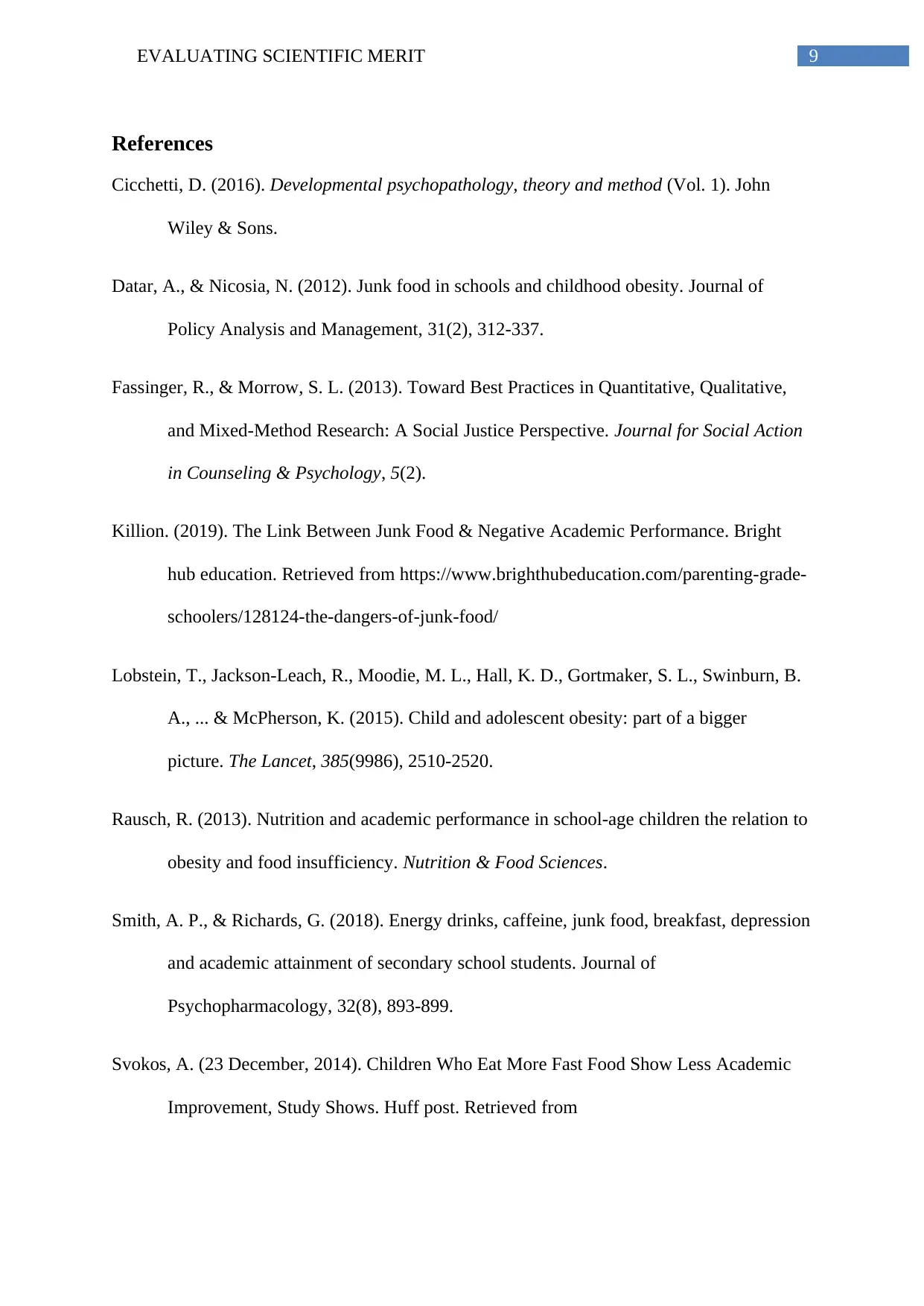
9EVALUATING SCIENTIFIC MERIT
References
Cicchetti, D. (2016). Developmental psychopathology, theory and method (Vol. 1). John
Wiley & Sons.
Datar, A., & Nicosia, N. (2012). Junk food in schools and childhood obesity. Journal of
Policy Analysis and Management, 31(2), 312-337.
Fassinger, R., & Morrow, S. L. (2013). Toward Best Practices in Quantitative, Qualitative,
and Mixed-Method Research: A Social Justice Perspective. Journal for Social Action
in Counseling & Psychology, 5(2).
Killion. (2019). The Link Between Junk Food & Negative Academic Performance. Bright
hub education. Retrieved from https://www.brighthubeducation.com/parenting-grade-
schoolers/128124-the-dangers-of-junk-food/
Lobstein, T., Jackson-Leach, R., Moodie, M. L., Hall, K. D., Gortmaker, S. L., Swinburn, B.
A., ... & McPherson, K. (2015). Child and adolescent obesity: part of a bigger
picture. The Lancet, 385(9986), 2510-2520.
Rausch, R. (2013). Nutrition and academic performance in school-age children the relation to
obesity and food insufficiency. Nutrition & Food Sciences.
Smith, A. P., & Richards, G. (2018). Energy drinks, caffeine, junk food, breakfast, depression
and academic attainment of secondary school students. Journal of
Psychopharmacology, 32(8), 893-899.
Svokos, A. (23 December, 2014). Children Who Eat More Fast Food Show Less Academic
Improvement, Study Shows. Huff post. Retrieved from
References
Cicchetti, D. (2016). Developmental psychopathology, theory and method (Vol. 1). John
Wiley & Sons.
Datar, A., & Nicosia, N. (2012). Junk food in schools and childhood obesity. Journal of
Policy Analysis and Management, 31(2), 312-337.
Fassinger, R., & Morrow, S. L. (2013). Toward Best Practices in Quantitative, Qualitative,
and Mixed-Method Research: A Social Justice Perspective. Journal for Social Action
in Counseling & Psychology, 5(2).
Killion. (2019). The Link Between Junk Food & Negative Academic Performance. Bright
hub education. Retrieved from https://www.brighthubeducation.com/parenting-grade-
schoolers/128124-the-dangers-of-junk-food/
Lobstein, T., Jackson-Leach, R., Moodie, M. L., Hall, K. D., Gortmaker, S. L., Swinburn, B.
A., ... & McPherson, K. (2015). Child and adolescent obesity: part of a bigger
picture. The Lancet, 385(9986), 2510-2520.
Rausch, R. (2013). Nutrition and academic performance in school-age children the relation to
obesity and food insufficiency. Nutrition & Food Sciences.
Smith, A. P., & Richards, G. (2018). Energy drinks, caffeine, junk food, breakfast, depression
and academic attainment of secondary school students. Journal of
Psychopharmacology, 32(8), 893-899.
Svokos, A. (23 December, 2014). Children Who Eat More Fast Food Show Less Academic
Improvement, Study Shows. Huff post. Retrieved from
Paraphrase This Document
Need a fresh take? Get an instant paraphrase of this document with our AI Paraphraser
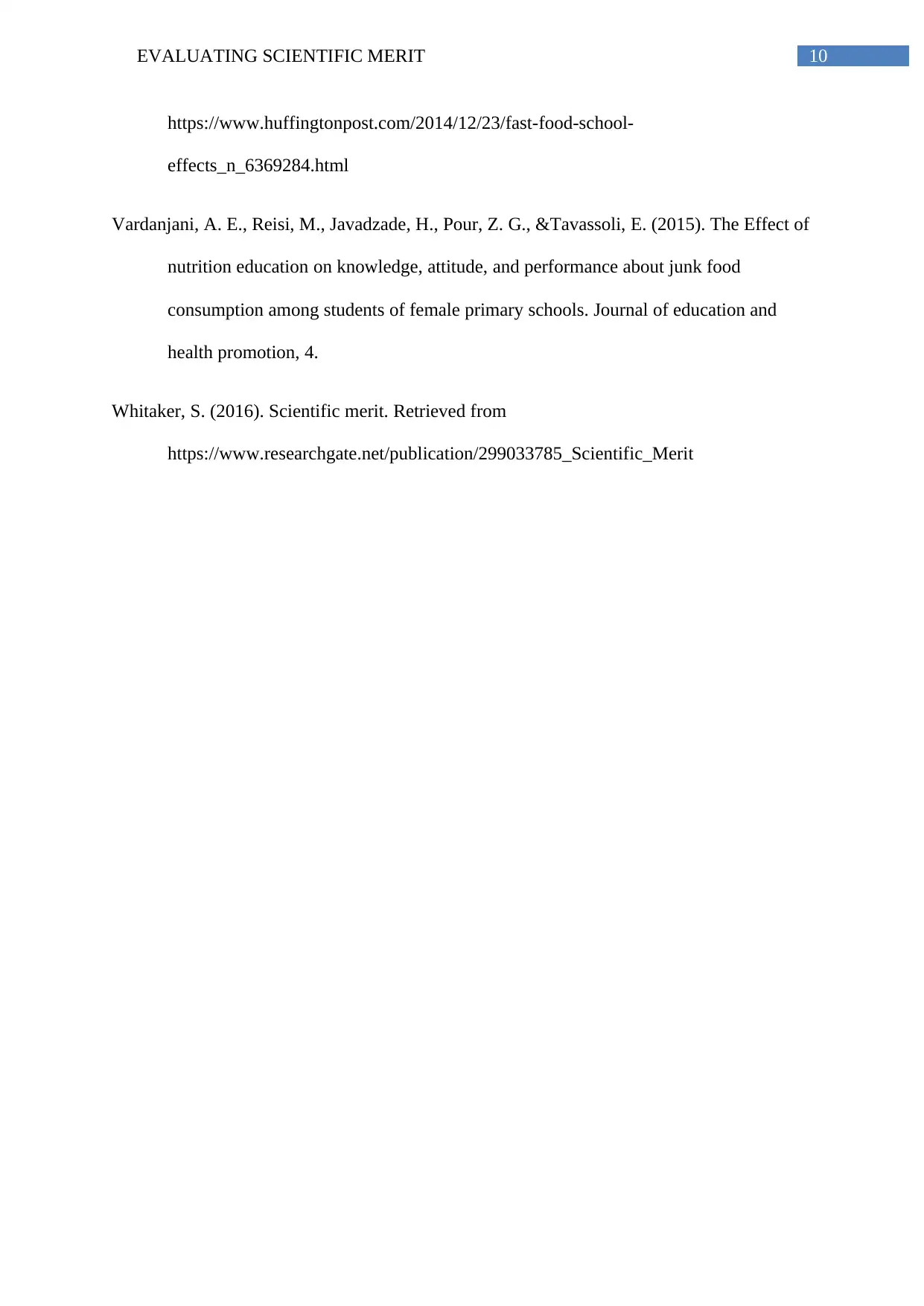
10EVALUATING SCIENTIFIC MERIT
https://www.huffingtonpost.com/2014/12/23/fast-food-school-
effects_n_6369284.html
Vardanjani, A. E., Reisi, M., Javadzade, H., Pour, Z. G., &Tavassoli, E. (2015). The Effect of
nutrition education on knowledge, attitude, and performance about junk food
consumption among students of female primary schools. Journal of education and
health promotion, 4.
Whitaker, S. (2016). Scientific merit. Retrieved from
https://www.researchgate.net/publication/299033785_Scientific_Merit
https://www.huffingtonpost.com/2014/12/23/fast-food-school-
effects_n_6369284.html
Vardanjani, A. E., Reisi, M., Javadzade, H., Pour, Z. G., &Tavassoli, E. (2015). The Effect of
nutrition education on knowledge, attitude, and performance about junk food
consumption among students of female primary schools. Journal of education and
health promotion, 4.
Whitaker, S. (2016). Scientific merit. Retrieved from
https://www.researchgate.net/publication/299033785_Scientific_Merit
1 out of 11
Related Documents
Your All-in-One AI-Powered Toolkit for Academic Success.
+13062052269
info@desklib.com
Available 24*7 on WhatsApp / Email
![[object Object]](/_next/static/media/star-bottom.7253800d.svg)
Unlock your academic potential
Copyright © 2020–2026 A2Z Services. All Rights Reserved. Developed and managed by ZUCOL.





